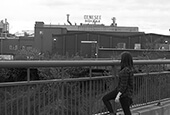Erica Fee
On a Monday at Aunt Rosie's
Interview No. 150
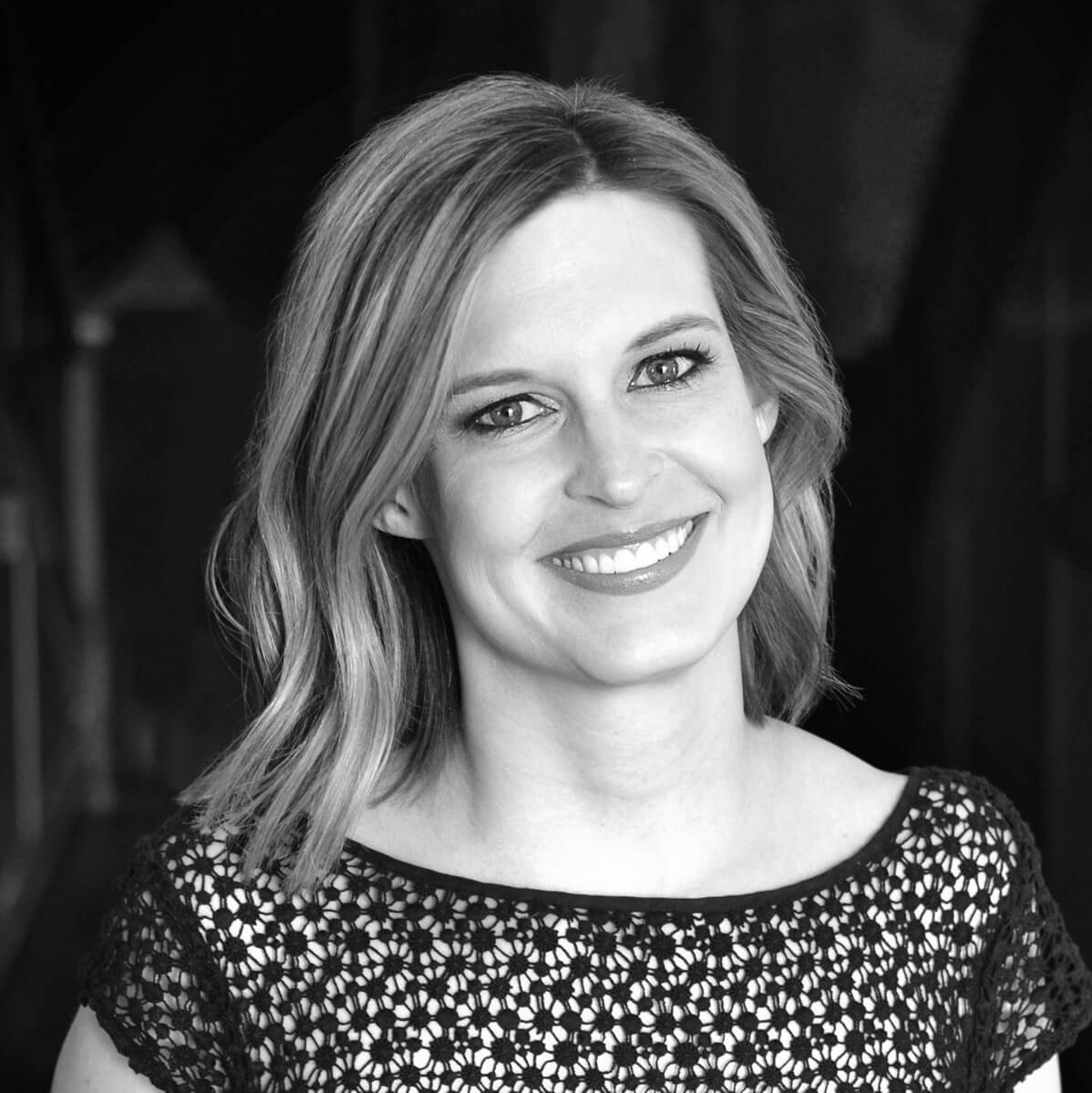

Photo by Matt DeTurck.
Interview by Emily Hessney Lynch.
Published September 13, 2018.
Where are you originally from? How did you end up in Rochester at this time in your life?
I’m originally from this area and some of my family has actually lived here since it was Rochesterville. We believe in the Flower City!
I attended the University of Rochester for undergrad, where I double-majored in Political Science and History with a minor in theatre. At UR, I was also a Take Five Scholar, which is a tuition-free fifth year intended for the study of an interdisciplinary subject of one’s choice. I studied the Hollywoodization of Worldwide Society.
Following UR, I went to grad school in London, where I received classical acting training at ArtsEd London, the oldest acting school in Britain. Acting led to directing and commercial theatre production. I had my own theatre production company, through which I produced in London, on tour, and at the Edinburgh Fringe.
While on vacation back in Rochester in 2009, I asked Nigel Maister, the artistic director of UR’s Todd Theatre, “Why doesn’t Rochester have a fringe festival?” He mentioned that UR President Joel Seligman had been holding meetings on the topic since 2008. While in Rochester, I attended a meeting of the stakeholders, and I became intrigued about the possibility of marrying my love of the Edinburgh Fringe with my love of Rochester. So, after this one meeting, I said to Joel, “If you want a fringe festival, I want to come back and run it.” I put in a proposal, and the rest is history.
I started working on the Rochester Fringe in December 2009 and traveled back and forth between Rochester and London for about a year. Our steering committee decided to incorporate and become a 501(c)3 in 2011. When the first Rochester Fringe Festival took place in 2012, many people called it an overnight success, but it really was an overnight success four years in the making.
What is your favorite part of living in Rochester?
The standard of living here in Rochester is great; we have access to good healthcare, there’s very little traffic, commutes are short, and the cost of living is more affordable than other parts of the world. Plus, Rochester is artistically and culturally rich. We’re lucky to have many groups here with deep roots, like Garth Fagan Dance, and new ones starting—there’s a certain energy here.
What are some of your favorite/secret Rochester spots?
It’s very grounding here, to have the hustle and bustle of downtown, and the option to escape to greenery. Standing on the banks of Irondequoit Bay and staring out at the water for ten minutes is grounding for me. You can drive down to the Finger Lakes and it feels like a vacation. It’s very important to me, and it anchors me.
I love all the regular spots that all Rochesterians love—the Public Market, grabbing a breakfast sandwich at Scott’s, all our great Fringe venues, walking by the canal. But really, having good company by your side makes any place the best place in the world.
What's your favorite neighborhood in the city?
I don’t know that I have one favorite neighborhood specifically–I just love all the places still to be discovered. At the end of May I was lucky enough to go on the most amazing walking tour of UR’s old Prince Street campus with Paul Burgett, whom we sadly lost recently. I’ll cherish the memory of that fascinating tour with him forever.
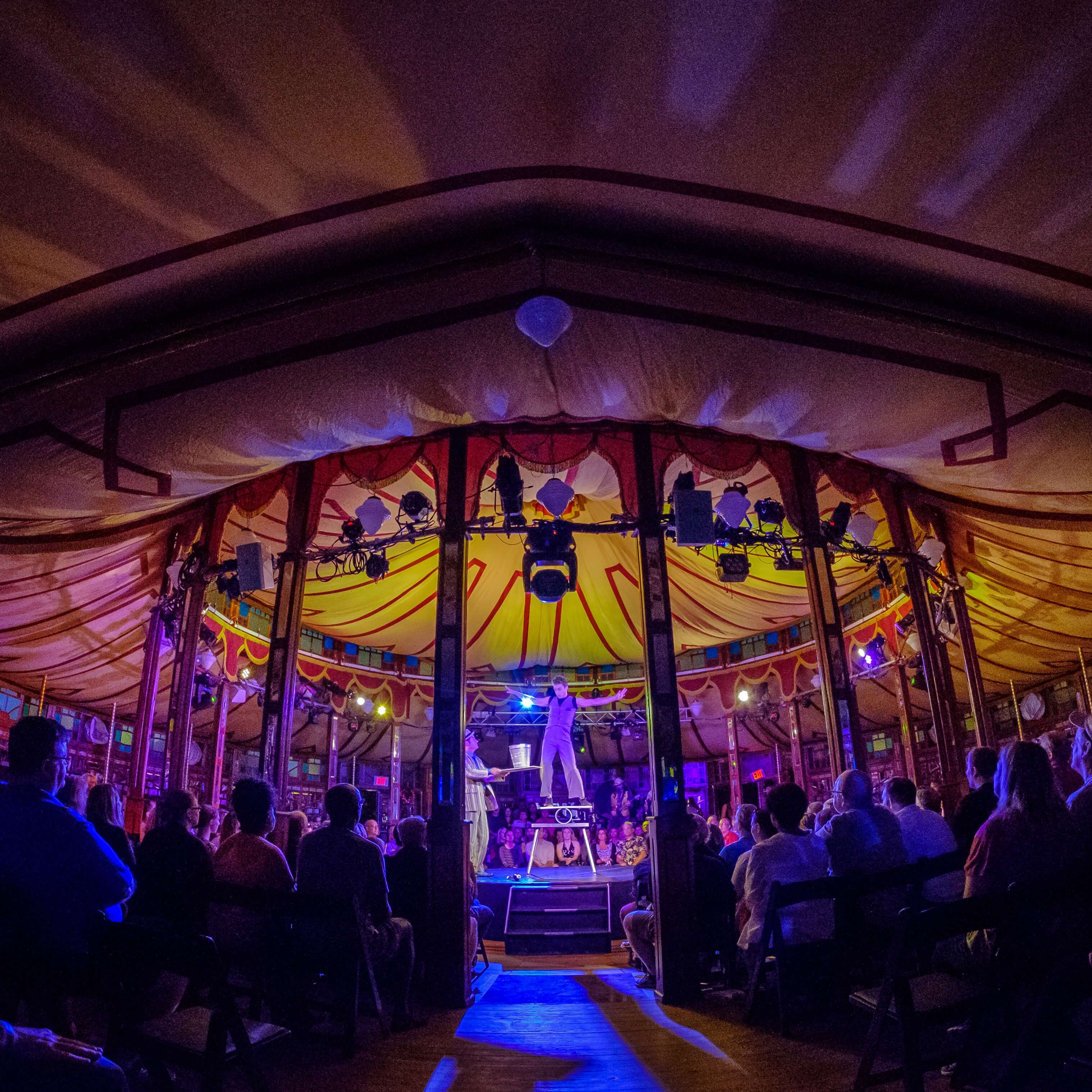

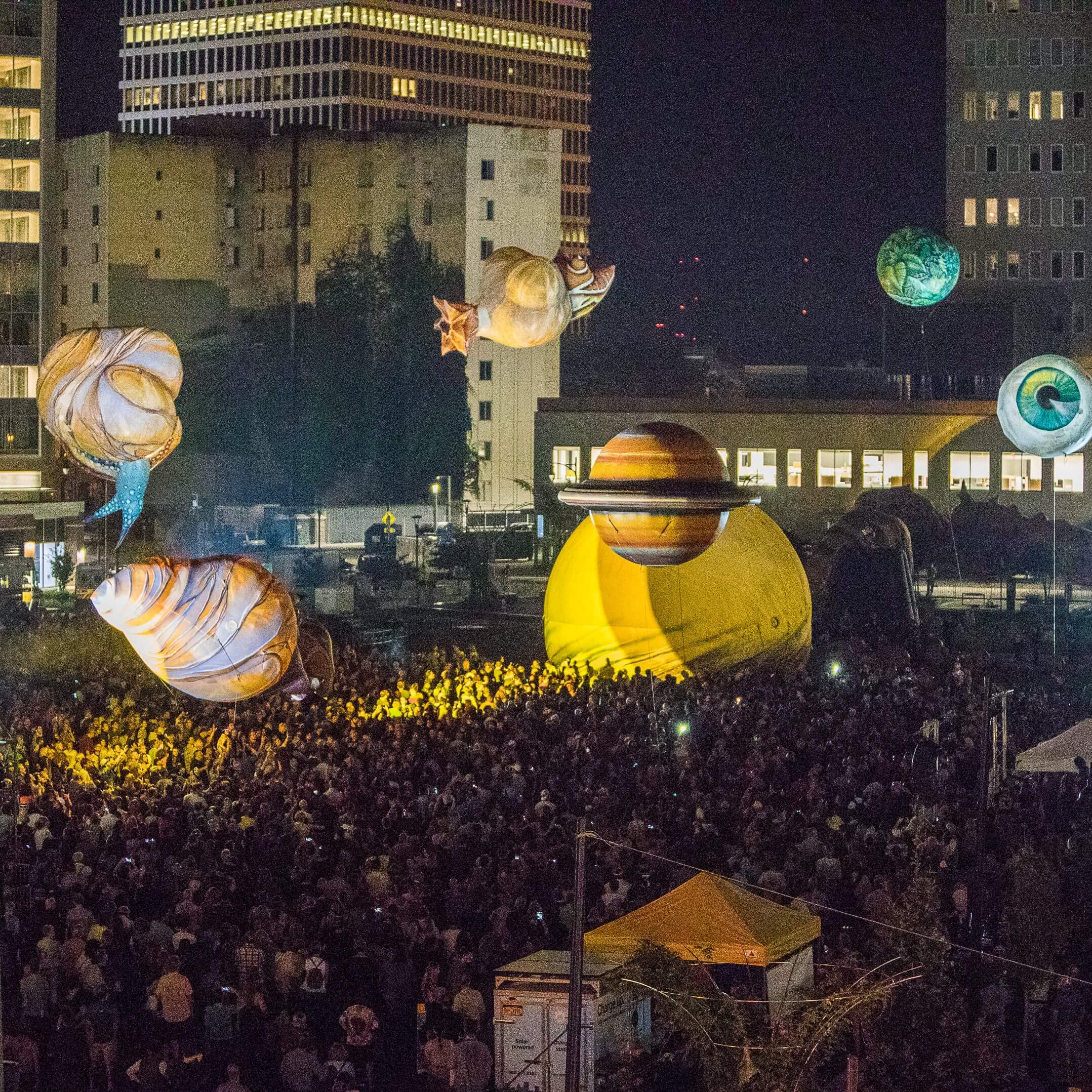

Photos by Erich Camping (left) and John Schlia (right).
What's the best place to get a garbage plate?
I don’t partake in them regularly, but when Rimini Protokoll, the renowned Berlin-based, site-specific theatre company that created Remote Rochester, was in town, we took them out for plates the night before they went home to Germany. Nick Tahou’s was closed, so we took them to Blu Wolf. They all thought they were surprisingly good! Kind like an American currywurst.
What is your personal coping mechanism for cold/gray weather?
True Rochesterians are hearty enough to push through and brush it off. I try to keep my mind on spring, and a week in a warm place doesn’t hurt. Other than that, Fringe keeps me busy all year round.
What makes Rochester unique?
Rochesterians make Rochester unique. It may sound cliché, but it’s the people who make the place special. Many may not realize this, but Rochester actually has a great reputation nationwide with artists. Dan Castellaneta, who is the voice of Homer Simpson, has said for years that Rochester audiences are the best because they listen and respond. I think Rochesterians can sometimes get a reputation for being conservative—for acting like we just stepped out of the pages of Smugtown—but I’ve found audiences here to be incredibly open. That sets us apart.
What do you think could be improved?
Poverty in the city is shameful. Some of the richest suburbs in the state are right next to the poorest neighborhoods. Tackling that issue needs to be our top priority.
Aside from that, Rochester could do with a very good boost of self-esteem. Festivals are known to do just that. I often hear people saying during Fringe, “The thing is, I don’t even feel like I’m in Rochester.” But you should feel like you’re in Rochester! We have endless potential but need a positivity boost. We are changing as a city and I wish we could focus on the future rather than the past.
You spoke at the University of Rochester's Commencement in 2016. What was that like?
Just being asked was a little funny, because when I was called into President Joel Seligman’s office, I had no idea why so it was a little nerve-wracking! Turns out he was asking me to be the commencement speaker. While commencement was 37 degrees with ice pellets, it seemed that the students were really listening to my message, which was to not structure your life or your plans so rigidly that you close yourself off to change and surprise. And, I was lucky to work with comedian Jamie Lissow to help develop some of the gags.
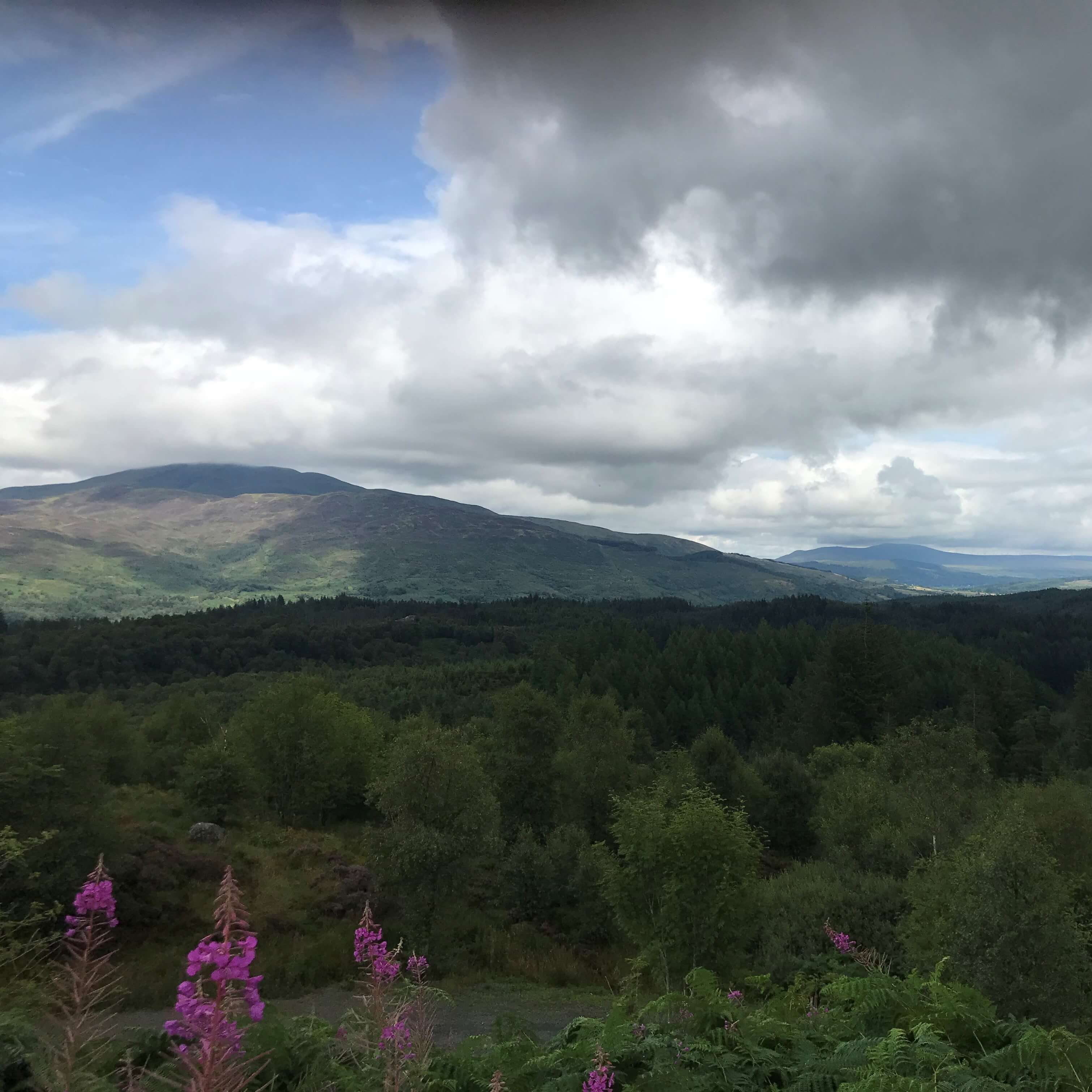

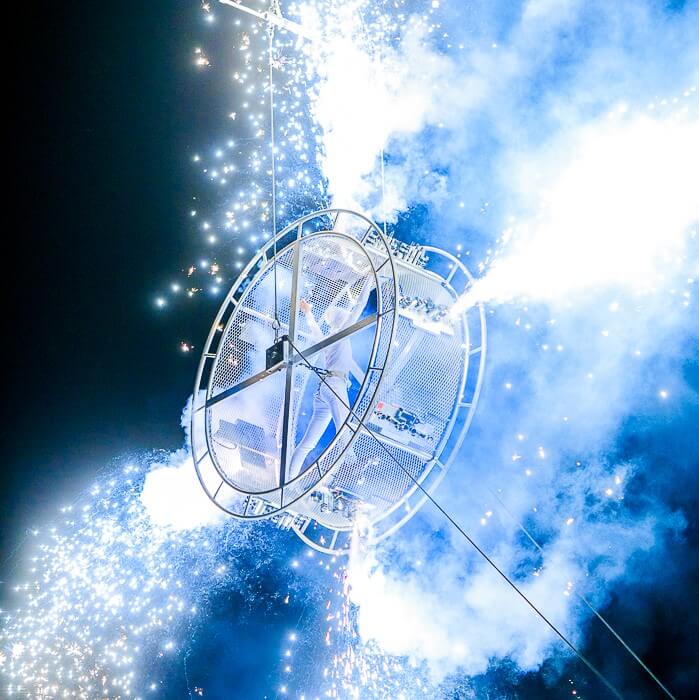

Photos by Erica Fee (left) and Erich Camping (right).
What is a day in the life of the Fringe producer like? What goes into it behind the scenes that the public never realizes?
It’s crazy. When I studied as a commercial producer with the Society of London Theatres, we were officially discouraged. We were also taught that being a producer is essentially all the jobs you can’t think of—if you don’t know who’s doing it, it’s probably you. I’m a jack of all trades. In a normal day, I’m working with artists, fundraising (we’re a not-for-profit, which many people don’t realize), marketing and PR, logistics, permits, venues, government officials and more. I am also president of our board, and it’s a working board, which is pretty uncommon. We meet every two weeks! It’s an endless list.
What is unique about Rochester's Fringe?
There are more than 250 fringes in the world. We are a bifurcated festival. The venues program the shows themselves, and we program the headliners—everything from the Spiegeltent to what you see on Parcel 5, in MLK Park, and in the Eastman Theatre. Our goal is to entice people downtown so then they stay and filter out to all the venues. And you know those big outdoor shows we have every year? Those are totally unique to the Rochester Model.
How would you explain Fringe to someone who's never experienced it before?
It’s a multi-genre performing arts festival, featuring comedy, theatre, music, dance, children’s entertainment—and all kinds of shows that can’t be classified. It’s revivals, it’s new works, it’s a whole range. “Fringe-ing” is the act of bopping around to venues, seeing more than one show a night.
What's your favorite Fringe memory?
It’s always very heartwarming to see Rochesterians take to these large outdoor shows that are hard to describe. People expect us to deliver something different, and they just come and respond. It thrills me every time when the audience gets that “aha” moment.
What are you most looking forward to about this year's Fringe?
It’s like being a parent; I can’t have favorites. I’m most looking forward to the energy. The Director of Philadelphia’s FringeArts once said, “I don’t know the theme of each year’s Fringe until afterwards.” It brings us so much surprise and delight to watch it all unfold each year. I’m looking forward to being surprised and seeing what the runaway hit will be.
Any words of wisdom for creatives and artists in Rochester?
Rochester is a great home base for arts groups. You can get a relatively affordable rehearsal space, you have a community that’s very accepting and understands the value of the arts, and it’s easy to tour from Rochester out to Toronto, New York, and beyond.
Erica Fee is the producer of the KeyBank Rochester Fringe Festival. She loves being surprised and delighted by each year's Fringe. For more of her perspective, visit our Instagram.

